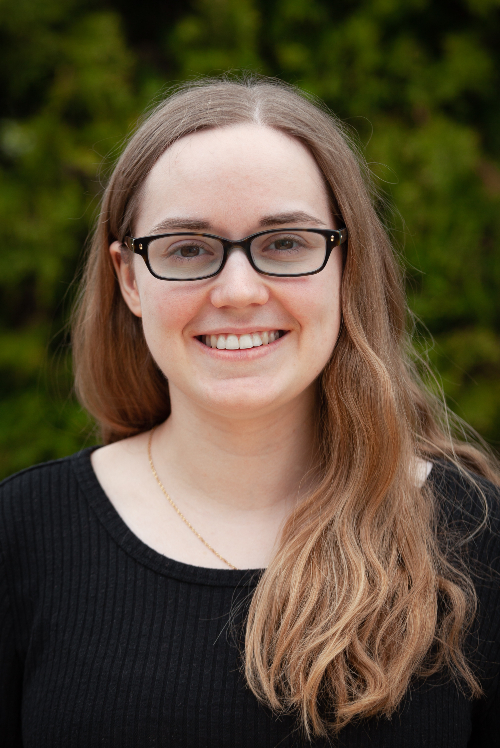CUP Graduate Student Equity Award Profile: Bryna Gibbons
24 January 2023

“Looking back, I think we can point out a lot of research that was harmful, unproductive, inaccurate, or exploitative. I think community-based research is a way of recognizing the strengths that already exist in communities because communities do amazing things around the world all the time without the help of academics and researchers.”
This article is part of a series highlighting the recipients of the Graduate Student Equity Award offered by the Community-University Partnership (CUP) in the School of Public Health. The award supports graduate students pursuing community-engaged research and is made possible with funding from the Suncor Energy Foundation.
Bryna is a second-year student in the Master of Public Health in Health Promotion program through the School of Public Health. The course-based program prepares students to work in a variety of community-engaged settings and puts a strong emphasis on practical hands-on experience.
Bryna didn’t begin her educational journey with the goal of engaging communities, however.
“I did my undergrad in sociology at Campus Saint-Jean, and I think that was a very valuable place to start. It gave me an in-depth view of society, people, and academia and taught me to challenge what we could call ‘traditional’ understandings of research.”
Bryna says it was a course focusing on the social determinants of health, along with her growing understanding of what it means to identify with an equity-deserving community, that influenced her to pursue a master’s degree related to community well-being.
“I’m queer, but I didn’t come out until partway through my bachelor’s degree, so I didn’t really have a concrete idea of what I was until I started to understand the community that I could be a part of. I also started noticing my own experience, especially during COVID when everything stopped—there was no Pride, no gatherings, and fewer ways of connecting. I think COVID challenged us to think about the things that tie us together when we can’t be together. What are the shared experiences?
“As soon as I looked into Health Promotion, I said, ‘Oh, wait, this is the application of everything I’ve been learning about how we can understand health and how health and social issues are connected.’ This program does something with that information. I think it’s the opportunity to do a practicum instead of a two-year research project that was most exciting.”
While Bryna is still working out the details of her practicum, she says her classes have exposed her to many new ideas, including the theory and application of qualitative research, which is central to many community-based research projects.
“As an undergraduate, I didn’t feel like anyone was really talking about that stuff. Qualitative research was still a peripheral thing. I did read one article back then, though, that was reporting on the experiences of sexual minorities. I remember just feeling the power of people’s words being presented this way. That felt like a ‘mind-blown’ moment.”
Her coursework is also teaching her to recognize the diverse applications, as well as challenges, of community-based research. For example, she recently completed a short-term practical project through SPH 504, a course in program evaluation taught by CUP’s associate director Dr. Rebecca Gokiert where students and community participants (called “key informants”) collaborate on designing evaluation programs in response to real-world needs identified by community organizations.
“This course gave us a concrete case study to hold on to. It was a great opportunity to consider what community engagement can look like, how to facilitate it, and how to draw on the knowledge that exists and either expand on it or apply it. Of course, there are still some gaps in how we understand and do community evaluations, but this course has also helped me identify more of those gaps.”
Bryna says participating in CUP’s community of practice sessions along with the other recipients of the Graduate Student Equity Award has been a great supplement to her coursework, allowing her to build relationships with other graduate students with unique perspectives.
“There are several other School of Public Health students in the community of practice, so at first I thought maybe we’d all be doing very similar things. But we’re not. There is a ton of diversity in what people are focusing on and interested in.”
By the second session, she says, the group was already engaged in critical in-depth discussions.
“I came in with a question that had been on my mind: how do we do community-engaged work without overburdening the people we are working with? And that started up an interesting discussion. It was great to come and talk about it with a group of people who have had similar questions. I really look forward to the remaining sessions and seeing how everyone’s work progresses.”
Bryna sees her current goal as continuing to build the skills to work in community health promotion after she graduates. She says this requires being flexible and open to opportunities.
“I believe health promotion practitioners need to be a jack of all trades in some way rather than having deep specialized knowledge in one area. Take COVID, for example. A few years ago, no practitioners would have said they were going to be working on COVID measures. Part of community-engaged work is that you don’t necessarily know what will be needed and when.”